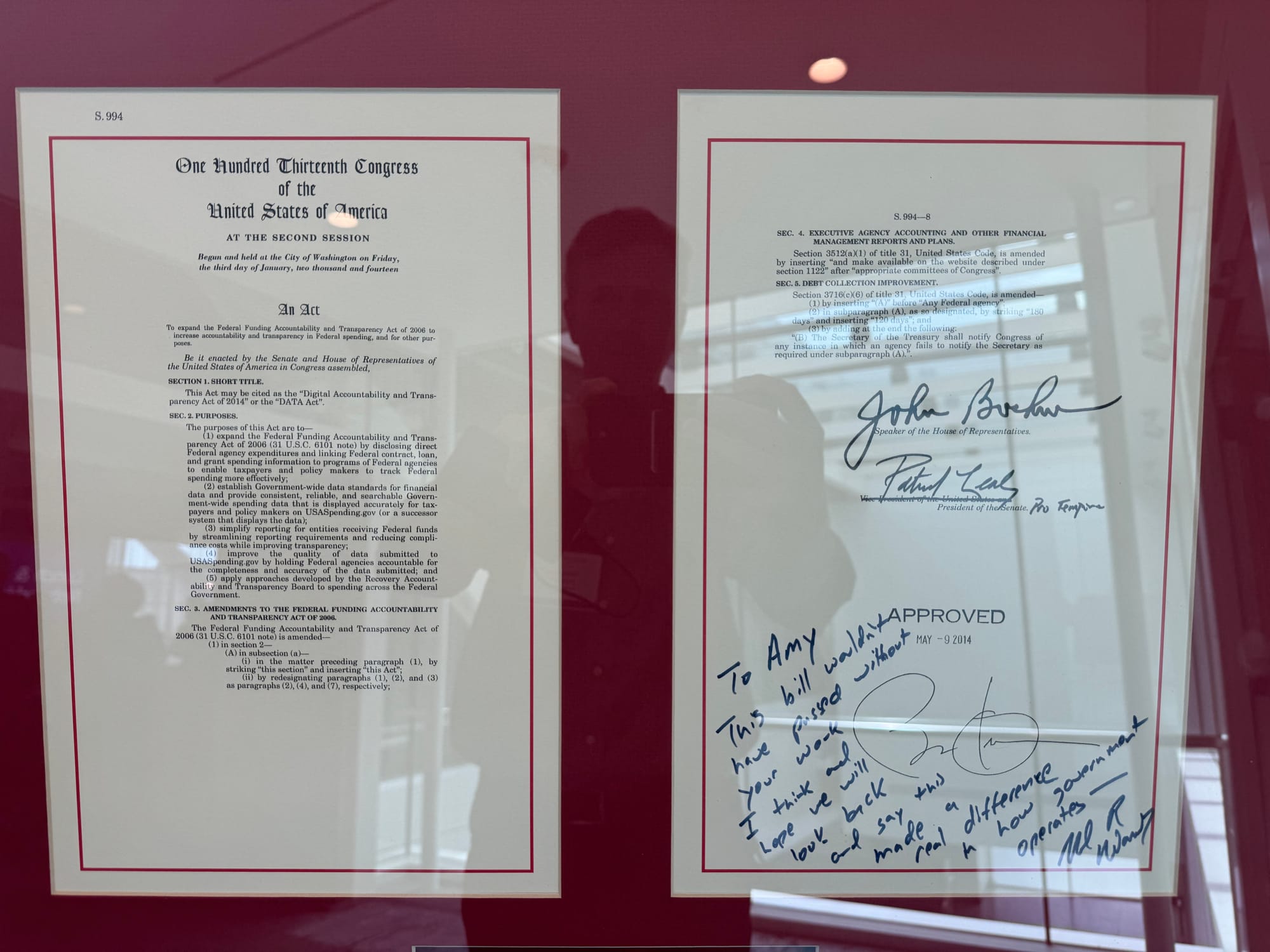At the 10th anniversary of the DATA Act, bipartisan collaboration around improved transparency shone bright

Hello from rainy DC. Alex Howard here, with another civic text. Sorry to be a bit out of pocket this past week; I've been tending to family matters and out of writing rhythm. (Much more to come!) As always, please feel free to reach out directly to me at alex@governing.digital, to share these newsletters if you find them valuable, and upgrade to being a paid subscriber if you'd like to support my work.
On to today's topic: a positive story out of DC that you probably didn't see on the evening news or a front page. In a turbulent era often marked by partisan rancor, division, and anger, it was a breath of fresh air to attend a celebration of bipartisanship, collaboration, and positive energy in Washington last week.

There was also a lot of sunshine on a hot day in Washington, which was perfect atmosphere for a visit to the newly opened Bloomberg Center in the former Newseum building on Pennsylvania to celebrate an open government milestone.
I have been fortunate to have covered the Digital Accountability and Transparency Act of 2014 — AKA the "DATA Act" – from its inception to enactment as a journalist, and then to watchdog its implementation as an advocate at the Sunlight Foundation. Getting the opportunity to thank a United States Senator for getting this done was a meaningful experience, alongside checking in with the staffers and civil servants who made a big idea real.
If you didn’t hear about the anniversary of the DATA Act, blame the “bad news bias” that pervades our news media, along with the paired challenges of telling a story about how our nation’s first open government data law passed Congress in 2014 and then was successfully implemented over the past decade across administrations.

Let's step back a bit. If you’re unfamiliar with the history of the DATA Act, as many folks are, Senator Tom Coburn M.D. and then-Senator Barack Obama wrote a bill to put government financial data online in 2006: The first implementation of USASpending.gov, however, had major data quality issues, as the Sunlight Foundation documented at ClearSpending.org.
After the Recovery Act of 2009 became a test case for open data, Senator Rob Portman, Senator Mark Warner, Rep. Darrell Issa, and Rep. Elijah Cummings applied the lessons learned from standardizing and tracking hundreds of billions of dollars of spending into the legislation that became the DATA Act of 2014. )The legislative history maintained by the House Oversight Committee offers more detail, for those interested.)
Robert Shea, a former White House official, called the bill the “most significant advancement in transparency in the world” at last week's event. While I think that’s hyperbolic — freedom of information laws are more significant, in my book – it reflects how significant this work has been in American history.
On reflection, there are few other laws that I’ve seen unite Congress this way across partisan divides.
While Pew Internet’s 2015 survey of open government data is now dated, the results still suggest why: there’s transpartisan, crosspartisan, nonpartisan, AND bipartisan support for accurate, proactive disclosure of what our government is spending our taxpayer dollars on the Internet.
All Americans want to see where the dollars are flowing. Open government is a subject even Ralph Nader and Grover Norquist agree on. Moderating a discussion with those fellas was a unique experience!
In 2024, this topic is still broadly bipartisan, said Senator Warner last week at Hopkins, noting ongoing collaboration with Rep. McHenry and Senator Crapo.
As Senator Warner also noted, however, the promise of the DATA Act “has never been transparency for the sake of transparency, but make sure the data is used.”
The outcome of the DATA Act is increasing the usability, accessibility, and understandability of government spending. The Senator emphasized the importance of transparency to ensure public can understand what government is doing, to try to earn respect and making sure people are informed.
Warner noted ruefully that there are a lot of Americans who believe whacky stuff in conspiracy theories, which puts a premium on accuracy of direct disclosures.

The context of historic lows in trust are why every White House – and every Member of Congress – should engage the American people about usaspending.gov much more effectively and often, online and off – along with Build.gov, Invest.gov, Challenge.gov, CitizenScience.gov, Data.gov, and every other federal website that has more impact when more of the public is informed by disclosures and participates or collaborates in governance.
After the pandemic and trillions of dollars of spending, it’s clearer than ever that open government data is a form of critical (digital public) infrastructure for democracy.
I hope President Biden invests much more in public information as a public good, from continuing to upgrade the technologies are vital to 21st century governance to increasing the human capacity that’s necessary to implementing laws.
That’s perhaps the most important lesson I have taken away in terms of why the DATA Act was a success: people, not tech!

The Americans behind this outcome include legislators and staff, US officials, journalists, inspectors general, transparency advocates, technologists, and industry executives who all have played key roles as stakeholders over a decade.
To quote an old proverb I heard there, “If you want to go fast, go alone. If you want to go far, go together.”



